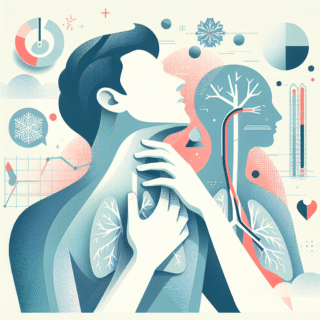
More Allergy, Asthma & Infectious Disease Articles
Can Cold Weather Cause Shortness of Breath?

Many people notice a chest tightness or shortness breathe when stepping out into freezing air. That quick change in temperature can feel alarming, especially for individuals with asthma, chronic obstructive pulmonary disease (COPD), heart disease, or anxiety. This article explains common mechanisms behind breathing difficulties in cold weather, who is at higher risk, practical prevention strategies, and when to seek medical help.
Understanding shortness of breath in cold weather
Cold air is denser and often drier than warm air. When you inhale cold, dry air, the lining of the airways can react by narrowing (bronchoconstriction) and producing more mucus. For people with reactive airways—such as those with asthma—this response may be rapid and significant, producing wheeze, cough, and a sensation of not getting enough air. Cold air can also cause blood vessels in the lungs to constrict and increase the work of breathing, which contributes to discomfort during exertion.
How cold air affects the lungs and heart
There are several physiological reasons cold weather and shortness of breath are linked. First, the airway reflexes that protect your lungs can be overstimulated by cold, dry air. Second, exercising in cold conditions raises oxygen demand while reducing ventilation efficiency, making breathing feel more difficult. Third, cold exposure can increase blood pressure and impose extra strain on the heart; someone with underlying cardiac disease may feel breathless with exertion on a cold day. Finally, viral infections and seasonal allergens that peak in colder months may exacerbate respiratory symptoms.
Common conditions that make symptoms worse
People with asthma are particularly sensitive to cold air. Research and clinical guidance note that cold-air–induced bronchospasm is a frequent trigger for asthma attacks. COPD patients may also report worsening shortness of breath in winter. Other contributors include viral respiratory infections, congestive heart failure, and even heightened anxiety in response to uncomfortable weather. If you have any of these conditions, ask your clinician about specific plans for cold-weather management.
Practical tips to reduce breathing trouble
- Cover your mouth and nose with a scarf or mask when outdoors to warm and humidify inhaled air.
- Warm up slowly before exertion; reduce intensity of outdoor exercise on very cold days.
- Use prescribed inhalers or preventive medications as directed by your healthcare provider.
- Avoid outdoor exercise when the temperature or wind chill is extreme, or move workouts indoors.
- Keep vaccinations up to date to reduce risk of respiratory infections that can worsen symptoms.
Many people ask: can cold weather cause shortness of breath? The short answer is that cold air can trigger or worsen breathlessness in susceptible individuals through airway constriction and increased cardiac or respiratory workload. If you’re trying to learn more about triggers that may overlap with dietary or immune issues, this short explainer on food sensitivities and respiratory triggers discusses how non-respiratory factors sometimes influence symptoms.
For readers seeking more detail about asthma and how environmental triggers affect airway physiology, a reliable overview is available from this clinical summary: asthma.
When to seek medical attention
If breathlessness is new, severe, worsening, or accompanied by chest pain, fainting, confusion, bluish lips or face, or fast irregular heartbeat, seek urgent medical care. Otherwise, if cold-related symptoms are recurrent or limiting your activities, make an appointment with your primary care provider or a pulmonologist for assessment. They can recommend objective testing (spirometry, oxygen saturation) and adjust treatment to reduce episodes.
Preventing winter exacerbations
Long-term strategies include controlling chronic conditions with appropriate medications, using inhaled preventives for asthma, quitting smoking, maintaining physical fitness, and ensuring good indoor humidity and air quality. Simple behavioral changes—such as breathing through a scarf and pacing activity—can make daily life more comfortable during colder months.
- Takeaways:
- Cold, dry air can trigger airway narrowing and make breathing feel harder, especially in asthma or COPD.
- Covering the mouth, pacing exertion, and using prescribed inhalers reduce risk of symptoms outdoors.
- Severe, sudden, or worsening breathlessness requires prompt medical evaluation.
Q: Does cold weather cause shortness of breath in healthy people?
A: In people without underlying lung or heart disease, cold air may cause mild discomfort or transient breathlessness during intense exertion. Persistent or severe symptoms in an otherwise healthy person should be evaluated to exclude other causes.
Q: How can I protect myself from cold-weather breathing problems?
A: Layer up, breathe through a scarf or mask to warm the air, avoid vigorous outdoor exercise in extreme cold, and follow any prescribed inhaler or treatment plans for chronic lung conditions.
Q: When should I see a doctor?
A: See a healthcare provider if your symptoms are recurrent, worsening, or interfere with activities, or immediately if you experience severe shortness of breath with chest pain, fainting, or confusion.
Other Articles You May Find of Interest...
- Can Amoxicillin Expire and Still Be Safe to Use?
- Pika Disease: What Are the Symptoms and How Can You Manage It?
- What Does Low Immunoglobulin M Mean for Your Health?
- The Benefits of Using Pink Himalayan Salt in Your Neti Pot
- Coping Strategies for Managing Asthma in Patients with Bronchitis
- How Interior Car Detailing Enhances Air Quality for Your RV
- Can a UTI Lead to Dizziness and Other Surprising Symptoms?














